Afghanistan: Taliban claim to have taken Panjshir Valley
- Published
Watch: Taliban fighters raise their flag in front of Panjshir's provincial governor's office
The Taliban have declared victory over the province of Panjshir northeast of the capital Kabul, the final pocket of territory which has remained outside their rule.
The group posted footage online of their fighters raising their flag there on Monday.
Resistance fighters however said they were still present in "all strategic positions" and "continue to fight".
Their leader has called for a "national uprising" against the Taliban.
In an audio recording posted on social media Ahmad Massoud, leader of the National Resistance Front of Afghanistan (NRF), blamed the international community for legitimising the Taliban and giving them military and political confidence.
"Wherever you are, inside or outside, I call on you to begin a national uprising for the dignity, freedom and prosperity of our country," he said.
The Taliban took control of the rest of Afghanistan three weeks ago, seizing the capital Kabul on 15 August following the collapse of the Western-backed government.
It comes nearly 20 years after US forces led an invasion to topple the Taliban.
Panjshir, a rugged mountain valley, is home to between 150,000 and 200,000 people. It was a centre of resistance when Afghanistan was under Soviet occupation in the 1980s and during the Taliban's previous period of rule, between 1996 and 2001.
ANALYSIS: What rise of Taliban means for Pakistan
BACKGROUND: The story of Afghanistan’s 'undefeated' valley
ON THE GROUND: In Kabul, Afghans adjust to a new, uncertain fate
"The Taliban haven't captured Panjshir," Ali Maisam, spokesman for the NRF, earlier told the BBC, saying he was "rejecting Taliban claims".
A tweet from the group's Twitter handle also said: "The struggle against the Taliban & their partners will continue until justice & freedom prevails."
But Taliban spokesman Zabihullah Mujahid said in a statement that "with this victory, our country is completely taken out of the quagmire of war".


The stunning Panjshir Valley is one of the smallest Afghan provinces, steeped in the biggest of legends.
Its rugged mountain terrain - with its maze of valleys, crevices and caves - has been its greatest weapon in repelling invaders. The Soviet army never managed to conquer it in the 1980s; the Taliban didn't control it the first time round in the 1990s.
So in this battle of opposing narratives, it's possible that the Taliban control the Panjshir's principal public arteries and areas, and a landscape known intimately only by its own inhabitants may now be sheltering the most defiant of resistance fighters. But the Taliban advance, however deep, is of great significance - both in symbolic and strategic terms. It's a sparkling jewel in the new Taliban crown as they embark on re-establishing their Islamic Emirate.
But resistance leaders including Ahmad Massoud, son of the legendary commander, and Amrullah Saleh, the vehement Taliban critic, won't go quietly into the night.

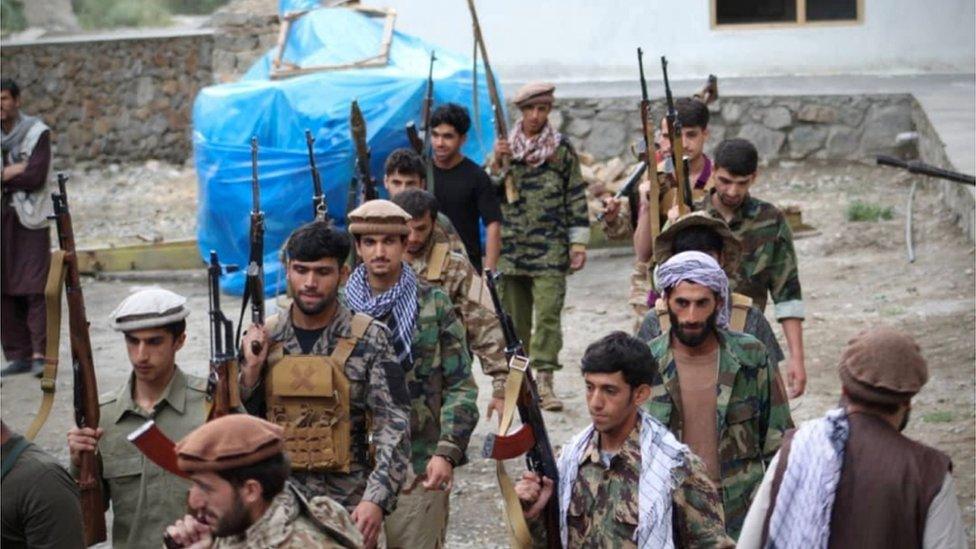
The National Resistance Front of Afghanistan (NRF) has been resisting Taliban rule
Since taking power the Taliban have sought to portray themselves as more tolerant, but incidents of brutality and repression are still being reported in parts of Afghanistan.
Although the group has promised to respect the rights of women, many fear a return to the way they were treated when the Taliban were previously in power. Women were forced to cover their faces outside, and suffered harsh punishments for minor transgressions.
Witnesses have told the BBC that Taliban militants shot and killed pregnant policewoman Banu Negar on Saturday.
The Taliban told the BBC they had no involvement in Negar's death and are investigating the incident.
There have also been several protests calling for respect for women's rights across Afghanistan.
On Monday, a group of women demonstrating in the northern city of Mazar-e-Sharif told BBC Persian that Taliban fighters had threatened them.
"They swore at us and insulted us, and said that we should disperse quickly or else they would beat us to death," she said, adding that the militants had also threatened anyone who tried to film them.
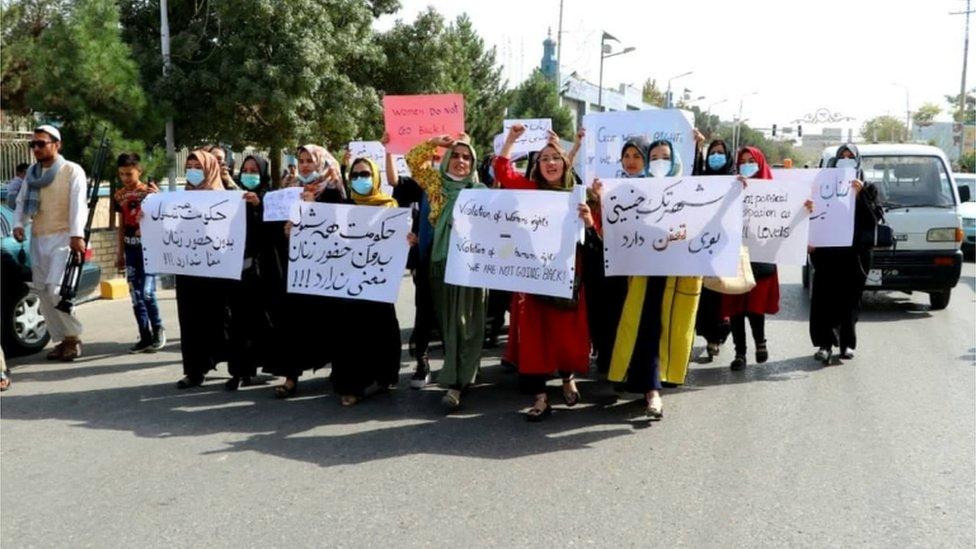
Women have taken part in protests demanding respect for their rights across Afghanistan
Human rights groups have also documented revenge killings, detentions and persecution of religious minorities. The Taliban have said officially that they will not seek retribution against those who worked for the former government.
As yet the Taliban have not announced the final make up of their new regime.
Spokesman Zabihullah Mujahid told reporters on Monday morning that all the important decisions have already been made, and that they are now working on the "technical issues".
He also said an interim government would be announced first, allowing for changes later.
Later on Monday, US President Joe Biden was asked by a reporter at the White House if he would recognise a Taliban government. "That's a long way off," he said.
Meanwhile, US Secretary of State Antony Blinken travelled to Qatar on Monday for talks with the government about the situation in Afghanistan, and to thank them for their part in helping the US evacuations from Kabul.
More than 120,000 people were air-lifted from the Afghan capital in a US-led operation before their forces fully withdrew from the country on 31 August.
A state department official travelling with Mr Blinken on Monday announced the US had helped evacuate four of its citizens over land - the first US citizens the government has helped leave the country since the withdrawal.
The Taliban were aware of the evacuation, the official said, but no details were given about their identity or which country they crossed into from Afghanistan.
US Republican congressman Ronny Jackson tweeted, external after the announcement that the four evacuees came from his district in Texas.

Are you in Panjshir? If it is safe to do so, share your experiences by emailing haveyoursay@bbc.co.uk, external.
Please include a contact number if you are willing to speak to a BBC journalist. You can also get in touch in the following ways:
WhatsApp: +44 7756 165803
Tweet: @BBC_HaveYourSay, external
Please read our terms & conditions and privacy policy
If you are reading this page and can't see the form you will need to visit the mobile version of the BBC website to submit your question or comment or you can email us at HaveYourSay@bbc.co.uk, external. Please include your name, age and location with any submission.
Related topics
- Published5 September 2021
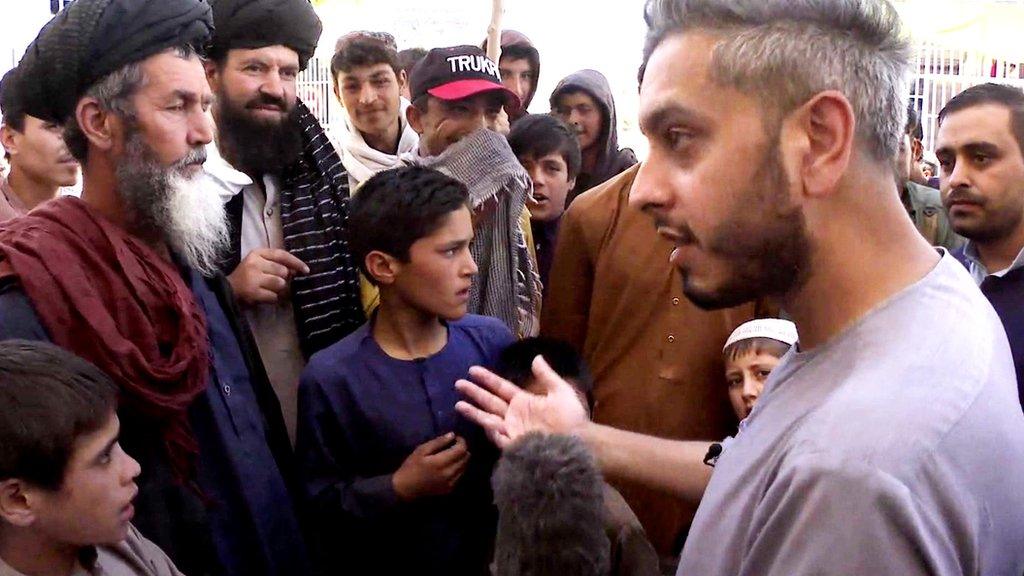
- Published3 September 2021
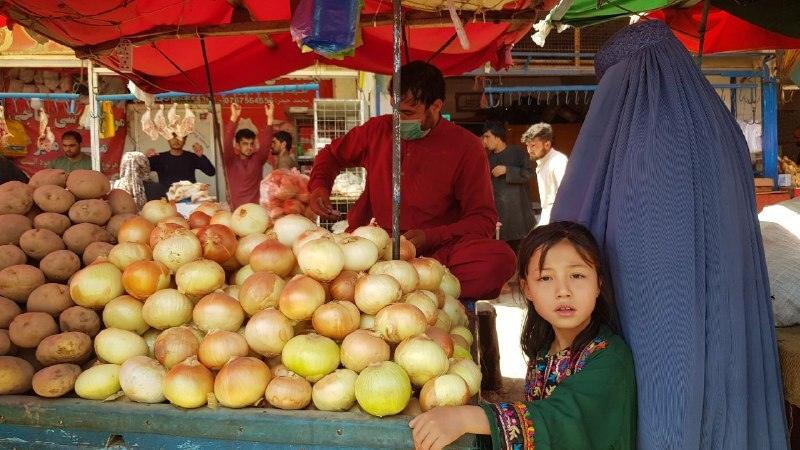
- Published3 September 2021
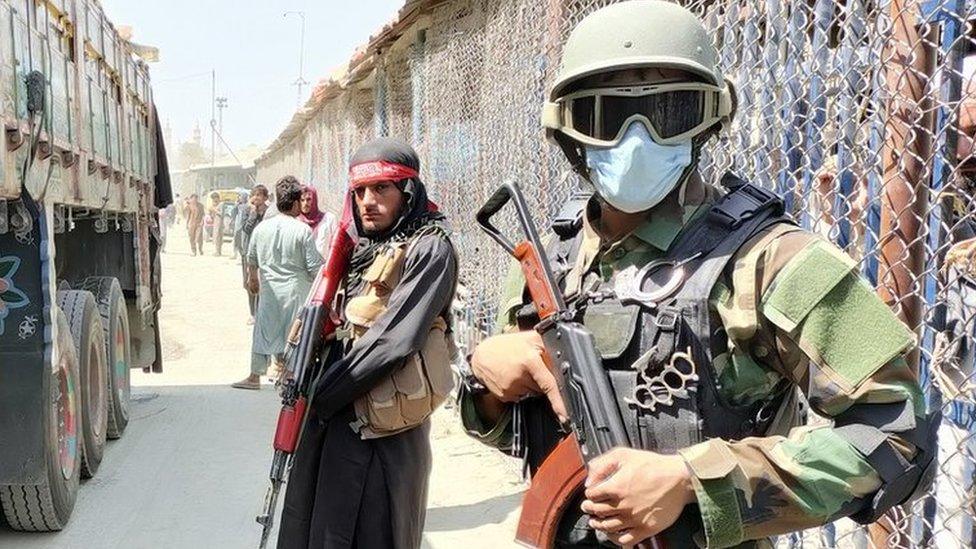
- Published2 September 2021
